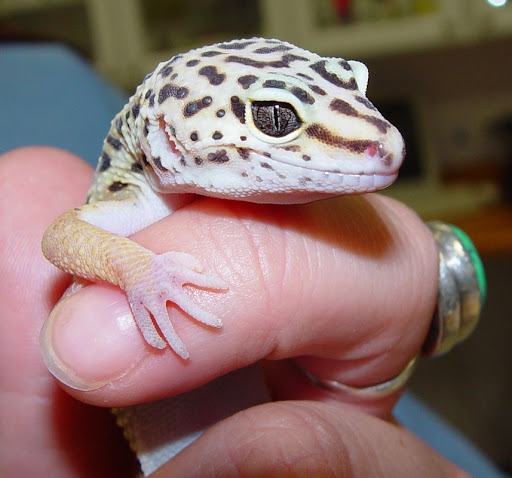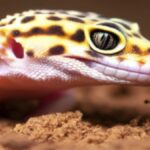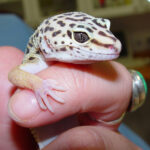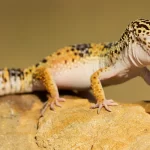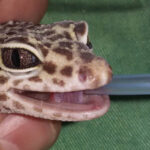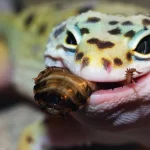Leopard geckos (Eublepharis macularius) are popular pet lizards known for their docile temperaments. However, like all animals, they can bite if threatened or handled roughly. Leopard gecko bites rarely cause serious damage, but they can be painful and risk infection. With proper handling techniques and first aid, leopard gecko bites can easily be prevented and treated at home. In this article we talk about Dealing with Leopard Gecko Bites- Prevention and Treatment Measures.
Preventing Leopard Gecko Bites
The best way to deal with leopard gecko bites is to prevent them from happening in the first place. Here are some tips:
Hand Taming
Tame your leopard gecko by regular gentle handling so it becomes comfortable with you. Support its whole body when picking it up and do not grab at its tail. Taming reduces defensive biting incidents.
Approach Slowly
Move slowly when putting your hand in the enclosure to pick up your leopard gecko. Avoid making sudden movements that may startle it. Give it time to see and smell you first.
No Tail Grabbing
Never grab your leopard gecko by its tail when handling. This is painful and frightening for them and will often trigger biting. Always fully support the body with both hands.
Manage Shedding
Leopard geckos are more irritable when dealing with a bad shed. Try to avoid handling them when undergoing a significant shed. Wait until a couple days after they finish shedding to handle again.
Clean Enclosure
Keep the tank very clean and spotless to minimize stressful conditions. Thoroughly wash decor items and substrates during weekly deep cleaning to prevent build ups.
Reduce Handling After Feeding
Leopard geckos typically prefer not being handled for at least a day after being fed large meals. Their attention and energy is focused on digesting, so hold off handling.
Quarantine New Geckos
House any new geckos separately for a minimum of 90 days before introducing them to others you own. This prevents passing parasites or illness and reduces stress and aggression.
With these preventative care tips, most leopard geckos can enjoy years of docile behavior as pets. But even well-socialized geckos may bite on rare occasions, usually due to mistakes in handling.
Treating Leopard Gecko Bites
If your gecko does manage to bite you, here is how to provide proper first aid treatment at home:
Clean The Wound
Immediately wash the bite area with warm soapy water for a couple of minutes to flush out bacteria and disinfect. Avoid using harsh chemical cleansers.
Apply Antibiotic Ointment
After washing, dry the area gently and apply antibiotic cream to the bite to prevent infection. Topical antibiotics like Neosporin work very well.
Dress it
Cover the wound using fresh bandages, gauzes or plasters once disinfected and treated with antibiotic ointment. Keeping it covered prevents recontamination.
Apply Ice Packs
Gently pressing an ice pack wrapped in cloth against the wound reduces painful swelling and inflammation. Apply for 10-15 minutes 2-3 times daily as needed for pain relief.
Observe for Signs of Infection
Check the bite daily for any worsening redness, swelling, oozing pus, red streaks or increased warmth which indicates infection. Seek medical treatment promptly if it appears infected.
Take Oral Pain Medications
Standard over-the-counter pills like paracetamol or ibuprofen ease bite pain, swelling and soreness. Always follow dosage instructions.
Allow It to Heal
Keep the wound clean, dressed and medicated while aiming to leave it undisturbed as much as realistically possible to heal. Most minor bite wounds heal just fine in 7-10 days with proper first aid.
See Your Doctor If Severe
Consult a physician promptly if the bite site shows severe infection, you develop flu-like symptoms or the wound is extremely deep with persistent bleeding or fails to close. Severe bites risk deeper tissue damage or bacterial contagion requiring antibiotics.
Stress & Infection Risk Factors
Your individual risk of stressful bites causing leopard gecko-induced infection depends on several health factors, including:
– Diabetes hindering normal wound healing abilities
– Compromised immunity vulnerabilities
– Chronic illnesses dependent on medications that impair infection-fighting capabilities
– Advanced age involving greater general infectious vulnerabilities
– Poor circulation reducing blood flow to extremities which impairs recovery
– Obesity making infections more refractory and difficult to treat
Any pre-existing condition or health vulnerability makes bites more concerning. Seek medical attention after a bite if you have additional risk factors until healing progresses fine under self care.
When to Seek Veterinary Care for Biting
While basic first aid suffices for most human victims of leopard gecko bites, veterinary intervention is often required if biting incidents happen between cohabited geckos. Signs to take pets in for care include:
– Bleeding or lacerations requiring sutures
– Infection setting in necessitating antibiotic injections or oral medication dosing
– Missing pieces of tail, feet or flesh requiring wound treatment plus pain control
– Eye injuries or damage
Take bitten geckos into qualified exotics veterinarians if their welfare appears compromised until they stabilize. Separate fighting cagemates immediately once biting starts.
Prevention and vigilance are key to dealing with leopard gecko bites. Carefully handle them using proper technique, observe for signs of illness stress and aggression in pets, quarantine newcomers and faithfully clean cages. Immediately wash and dress any bites that occur, plus continue monitoring for infection daily thereafter. With proper care and handling methods, most leopard geckos remain the mild-tempered captivating creatures that make them the world’s most popular pet lizard. I hope this Dealing with Leopard Gecko Bites- Prevention and Treatment Measures article helps you.

